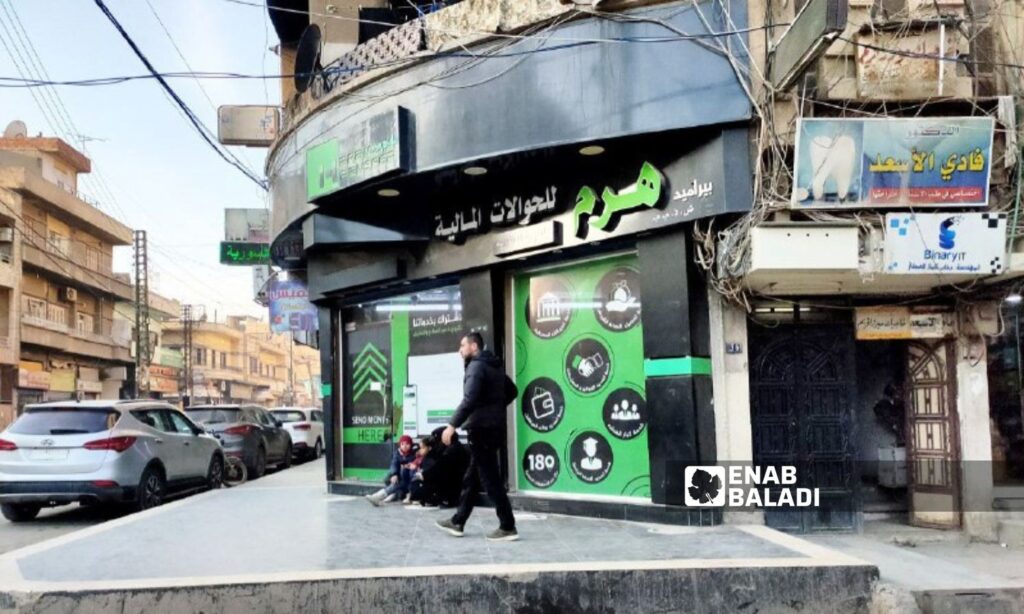Money transfers between Syrian provinces have become a problem for residents who need to transfer money for various purposes, whether for sales and purchases or to cover expenses for healthcare, education, and more, especially after the transfer limit was set to one million Syrian pounds.
A source at Al-Haram company in Latakia explained to Enab Baladi that the ceiling for internal transfers was set at one million Syrian pounds (approximately $67) across all money transfer companies, and this is not exclusive to Al-Haram.
The selling rate of the US dollar against the Syrian pound recorded 14,900 pounds on Monday, January 22, according to the S-P Today website, which specializes in currency exchange rates.
Mohammed al-Aliwi, 36, from the countryside of Qamishli, whose mother suffers from cancer, told Enab Baladi that he “suffered a lot” in transferring the necessary amounts for his mother’s treatment to Damascus.
He added that some medical tests cost him about 15 million Syrian pounds, and it was necessary to transfer the entire sum. When he went to one of the transfer companies, the employee told him that the maximum transfer amount was five million Syrian pounds, and when he returned the next day to transfer another part, the highest amount allowed for transfer had dropped to only one million Syrian pounds.
He mentioned that the transfer ceiling is not fixed and changes periodically, and to transfer the required amount, he made about seven transfers over ten days, considering the delay a significant additional suffering in hastening to secure treatment for his mother.
According to what Enab Baladi learned from several citizens who sent money transfers to Damascus, the company’s employees conduct “something resembling an investigation” about the sources of those transfers, whether they are international, the relationship between them and the person to whom the money is transferred, and the purpose of the transfer.
They explained that this makes them feel fear, anxiety, and tension despite the transfers being “ordinary”. Moreover, some company employees make direct contact with the recipient and ask them whether they truly know the sender.
Solutions citizens resort to
Sami al-Ali, 37, from Qamishli, had no choice but to divide the four million Syrian pounds he needed to send to his two brothers studying at the University of Damascus (one in the Faculty of Medicine and the other in the Faculty of Dentistry) between two people he knows from the city.
Each of them transfers a portion of the amount, but according to al-Ali, this solution is not always available, as some people fear transferring money in their names and are afraid of being held accountable, which forces him to look for new people each time he wants to transfer money.
Another solution citizens might turn to, as observed by Enab Baladi, is to fragment the amount and send it through more than one company on the same day. Al-Ali pointed out that this solution might not always work, as some companies stop transfer operations on the pretext of a network outage.
Issues related to the state of the currency
Al-Ali added to Enab Baladi that if a person manages to solve the issue of the transfer ceiling, another problem might confront them: transfer companies refusing to accept notes of 500-pound and 1000-pound denominations if they are old issues.
He mentioned that some companies even require all the money to be in denominations of 2000 and 5000 Syrian pounds.
As a result, those who want to transfer money often resort to exchanging the required denominations at exchange offices and paying a fee for this service.
Public and tricky verification
An employee of a money transfer company in Qamishli (who asked to remain anonymous and not to disclose the company’s name for security reasons) told Enab Baladi that the companies are obliged to follow these procedures, as the daily transfer ceiling allowed for each company varies, decreases, and changes periodically “sometimes from one day to the next.”
The company is also required to verify the source of the incoming transfer to determine if it is international because if that turns out to be true, the sender is accused of “financing terrorism and money laundering.”
The employee revealed a trick the companies use to determine the source of the transfer: “When a company employee asks for the recipient’s phone number from the sender, he takes the sender’s phone under the pretense of transferring the mobile number, but actually, he quickly reviews the conversation through WhatsApp, which is often used by the sender to convey the data, thereby sometimes learning that the transfer is coming through a specific company not licensed by the state, and therefore it is international.”
Regarding the rejection of old 500 and 1000 pound notes, the employee explained it is due to the collapse of the Syrian pound’s value against the dollar: “It’s unreasonable to accept a sum of five million in these denominations because its volume would be doubled, requiring larger storage spaces and costly and exhausting transportation.”
She added that the old currency notes are often tattered, torn, and difficult to count with machines, requiring a lot of time; therefore, they cannot be accepted because they create more “congestion and problems” in transfer companies.
On January 20, the Syrian regime’s president, Bashar al-Assad, issued a decree stating that unlicensed currency exchange and transfers between Syria and abroad, without a permit, would be punished with imprisonment ranging from 5 to 15 years, and a fine that could be up to three times the value of the seized amounts, without the possibility of a release.

